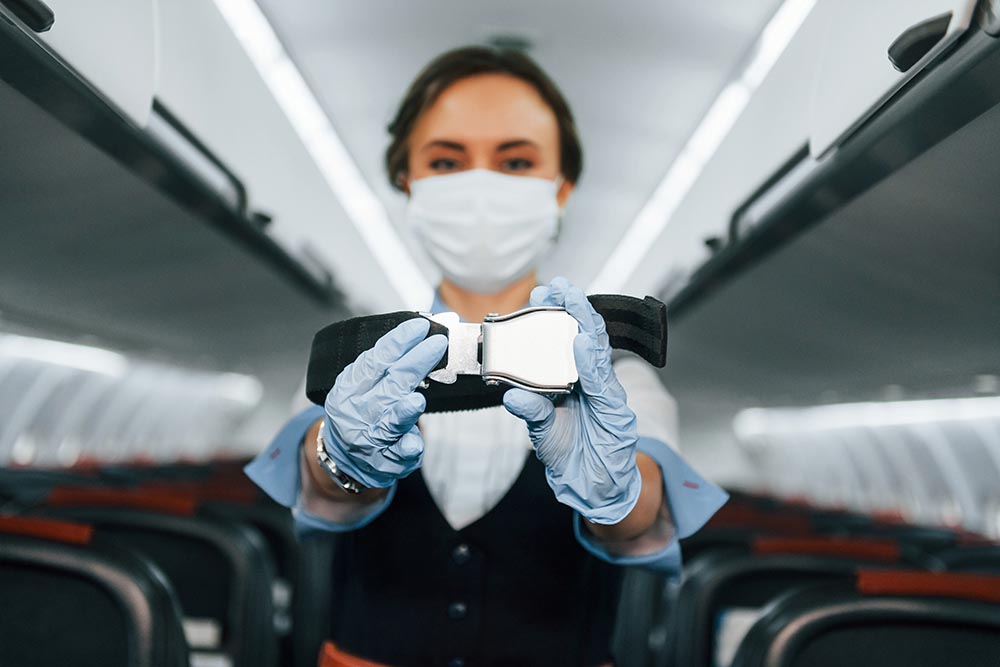Duty of care & corporate travel safety
Duty of care is no longer about having one overarching solution to make for seamless business trips. It’s about protecting and preparing your employees so they can carry out their jobs outside of the office as well and as safely as possible. It’s about lending a helping hand to make a series of choices that puts your travelers at the least risk possible, ensuring successful and productive business trips.
Business travel duty of care has come a long way since the start of the pandemic but there are still some ways to come, so keep reading to find out how you can keep your travelers safe.
Travel risk management
Travel risk management is about ensuring that you have steps in place in order to protect your travelers, by anticipating, preventing, and reacting to dangers that business travelers may face on their journeys. While these risks have increased due to the pandemic, the idea is to compensate for these risks through effective planning, reliable support and regularly reviewing your travel program.
Some of the potential travel risks are:
- Economic health
The economy has a direct impact on business travel, influencing the products and services that are consumed, and the budget that companies have at disposal to travel, plus the economic situation also affects companies’ necessity to control costs.
- Climate change and extreme weather
Extreme weather is more and more becoming a regular occurrence. Floods, turbulent winds, hurricanes, extreme snow and earthquakes are real obstacles that business travelers will face. Travel teams must be ready to adapt policies in order to support travelers delayed by extreme weather.
- World politics
World politics can affect business travel when there is civil unrest, war, protests and elections. If you have the responsibility of protecting your travelers, you must be aware of these potential risks and be able to assess whether there is a likelihood of this impacting their trips.
- Personal risks
Traveling can put you more at risk for theft, robbery and other unpredictable threats, especially when traveling to underdeveloped countries. As the person in charge of travel for your company, or if you’re booking your own trip, ensure that you sign up for embassy alerts and study the possible threats when traveling to potentially risky destinations.
- Cyber threats
Cyber threats can come in the form of hackers trying to access private information for personal gain. When traveling you must provide a lot of sensitive personal data, which should it be compromised can be potentially harmful. As a company to protect your employees, it’s important to provide proper training about how to recognize cyber threats and keep employees digitally aware to minimize the impact.
- Health risks
While Covid-19 still is no longer the main concern, we are faced again with the possibility of contracting other viruses and diseases while traveling. Make sure to keep your travelers safe by educating them on the potential health risks.
And to keep your travelers safe while traveling, we’ve made a Step-by-Step Guide to Seamless Business Travel Management Post-Pandemic.
To be sure, the business trip is worth it and cannot be replaced with a zoom meeting, check out our post:

related article
Steps to ensure corporate travel safety
1. Effective planning and information
To plan effectively you need to be sure to be able to provide up-to-date information about the destination and the associated travel risks. You may also want to inform travelers about potential risks such as:
- Social, political, economic or cultural conditions that are worth keeping in mind
- Safety and reliability of transportation (i.e. Is it safe to take the local bus or is it better to take a taxi?)
- Levels and severity of crime
- Possibility of natural disasters such as hurricanes, storms, earthquakes, tsunami, etc.
2. Booking
By using a Travel Management Company to help make business travel bookings, you can be sure to live up to your duty of care, corporate travel policy, automatically rejecting requests to risky destinations and setting up certain parameters in your travel policy. This ensures that travel requirements are met and are within policy before tickets are issued. Find out how to automate your travel policy.
When you use a Business Travel Management Platform like GetGoing, you have built-in features like GoSafe, which uses Artificial Intelligence to favor direct routes. Direct routes limit the potential for trip interruption. You also have access to a traveler tracking system, so at any given time you can see where your travelers are, helping you even more to fulfill your duty of care. Learn more about traveler safety.
3. Support
Make sure your company is ready to support your travelers in case of need. This means helping them with making bookings and better understanding your company’s travel policy, as well as providing assistance once they are on the road. Normally it is supporting travelers who need emergency medical assistance, get in a car accident or experience trip interruption and travel delays.


Discover the importance of a corporate wellbeing program in supporting your employees.
4. Traveling to destination
Once travelers are on the road, make sure they keep you posted that they made it safely to their destination and if there were any itinerary changes. Ensure that before travelers depart, they know how much they will get reimbursed for meals and travel expenses, and that they have an emergency contact number should they need it. A smoothly running trip means that travelers keep in touch with the people who are responsible in the company for travel whether that be HR or the Office Manager.
5. Traveling home
Learn from each other’s travel experiences. Were there long waits at airports or new safety procedures? Asking the right questions allows everyone in your office to better prepare for their business trips.
6. Feedback and review
In an ever-changing travel environment, it’s important to constantly review and update your travel policies. A big part of fulfilling your business travel duty of care is keeping up-to-date with the latest information so that you can protect your employees and make sure they’re safe.
Check in with travelers, especially those who travel often for suggestions and feedback and see how you are doing and where there is room for improvement.
Fulfilling your duty of care and ensuring corporate travel safety
Of course by following these steps, there are no guarantees that you won’t run into some glitches along the way as business travel slowly picks up, but by following these tips, you can do your best to keep your travelers safe, fulfill your business travel duty of care for and make getting back to travel all the easier.

